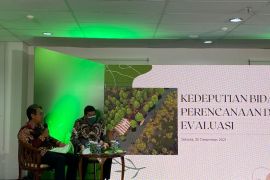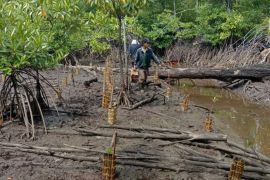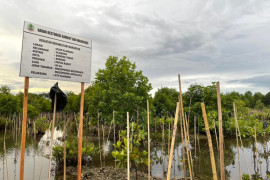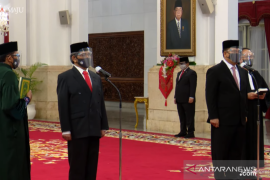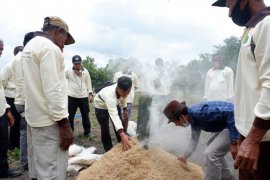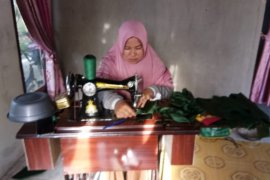The establishment of a peat restoration body is a great start."Jakarta (ANTARA News) - President Joko Widodo (Jokowi) installed Nazir Foead, former conservation director at the World Wildlife Fund (WWF), as head of the Peatland Restoration Agency (BRG) on January 20.
The agency, which has been set up based on Presidential Regulation Number 1 of 2016, is chiefly tasked with preventing forest fires that particularly occur in peatlands and to restore such areas gutted by forest fires, particularly on Sumatra and Kalimantan Islands.
While announcing the establishment of the agency on January 13, Jokowi, who described Foead as a competent and experienced figure, assigned the body to immediately draft an action plan to demonstrate to the world that Indonesia is serious about handling the damage caused to peatland areas.
After graduating from the University of Gadjah Mada in Yogyakarta, Foead began his career at WWF in 1992 and has since then dedicated himself to forest conservation efforts.
He was member of the Indonesian Chamber of Commerce and deputy chairman of the Permanent Committee of the Environment and Climate Change during the period between 2011 and 2013. He was appointed as head of the Indonesian Program at Climate and Land Use Alliance (CLUA) in 2014.
Foeads appointment as the new agencys chief is based on Presidential Decree Number 3 of 2016, dated January 18.
Following his inauguration, he immediately chalked out the agencys action plan as he did not want to waste time in the race against forest fires that could recur any time.
The appointment of the environmental activist to lead the initiative has been lauded by Greenpeace.
"If peat protection regulations are sufficiently strengthened, Nazir will be in a position to save the countrys precious tropical peatland landscapes, thereby helping to reduce fires and carbon emissions," Greenpeace Indonesia forest campaigner Teguh Surya noted in a statement on January 15.
Clearing and draining of peatlands for oil palm and pulpwood plantations is a major cause of Indonesias recurring fire and haze crisis, which last year impacted the health of millions in South-East Asia and cost Indonesia's economy an estimated $16.1 billion.
According to World Bank Indonesia Country Director Rodrigo Chaves, haze was the real cause of damage to the Indonesian economy, costing the nation twice as much as it took to rebuild after the 2004 tsunami.
As a result, the World Bank warns, Indonesia needs to develop a better; more comprehensive plan for preventing wildfires in the first place and dealing with their aftermath, or it may find itself hemorrhaging money in an unhealthy and growth-stagnating way.
"The establishment of a peat restoration body is a great start. Successful peat protection will depend however on further reforms, including ending secrecy over maps of industry concessions in forests and peatlands, to allow full public participation in monitoring and restoration," said Surya.
President Joko Widodo showed the way to end peatland destruction by personally damming a drainage canal to re-wet a peatland area in Riau province in late 2014.
"However, his initiative faltered due to a lack of policy clarity and coordination. For the new Peat Restoration Agency to overcome the potential hurdle of its limited authority, every level of government must provide full support including coordination and concrete action in the field," the Greenpeace activist said.
The Peat Restoration Agencys enabling decree targets a very modest 2 million hectares for restoration by 2020. This is far less than the total area of damaged peatland, which the government has vowed to restore.
"The Decree should aim higher than protecting just two million hectares out of more than twenty million hectares of Indonesia's peatlands. Preventing fires from returning will only be possible if all damaged peatland landscapes are restored, with clear indicators and deadlines," Teguh Surya said.
Climate consultant Wimar Witoelar wrote on the Jakarta Post recently that the appointment of Foead as BRG head is a clear signal that the nation intends to defend its forests and protect the environment by drastically limiting the risks of forest fires and haze.
This in effect is a clear follow-up to the Paris Agreement that commits the nations of the world to the curtailment of climate change, he said.
"President Jokowi is investing our human capital by appointing promising public officials such as Nazir, the initial head of the BRG," Wimar Witoelar stated.
The agency is a non-structural body under the President, and accountable to him.
Having a tenure until December 31, 2020, the agency will have a secretariat, four deputies, an expert team, and a technical steering team that will include provincial governors and relevant deputies and director generals.
The expert team members come from universities, research institutes, professionals and larger community.
Earlier, Environmental Affairs and Forestry Minister Siti Nurbaya Bakar explained that the agencys task is to restore the landscape of peatland ecology with regard to saving and protecting them as well as preventing them from fires or being burnt down.
Between two and three million hectares of peatland areas will be restored by the agency with the cooperation of several institutions and ministries such as the environmental affairs and forestry ministry, the public works and housing ministry, the agriculture ministry, the Agrarian and Spatial Layout Ministry and the National Development Planning Agency (Bappenas).
No single country in the world has ever restored peatland in a large scale, she remarked.
Indonesias peatland area is estimated at 20.6 million hectares, or about 10.8 percent of Indonesias total land area. Of this, approximately 7.2 million hectare, or 35 percent, is located on Sumatra Island.
Peatland serves to preserve water resources, mitigate flooding, prevent sea water intrusion, support biodiversity, and control the climate through carbon absorption and storage.
The Secretary General of the environmental affairs and forestry ministry, Bambang Handroyono, said in Palembang, South Sumatra, on Jan 12, that a similar agency will also be established at the provincial level.
"At the national level, the restoration agency will be coordinated by the Ministry of Environmental Affairs and Forestry, while at the local level, it will be under the coordination of the respective governor," he said.
(T.F001/INE/KR-BSR)
Reporter: Fardah
Editor: Priyambodo RH
Copyright © ANTARA 2016




